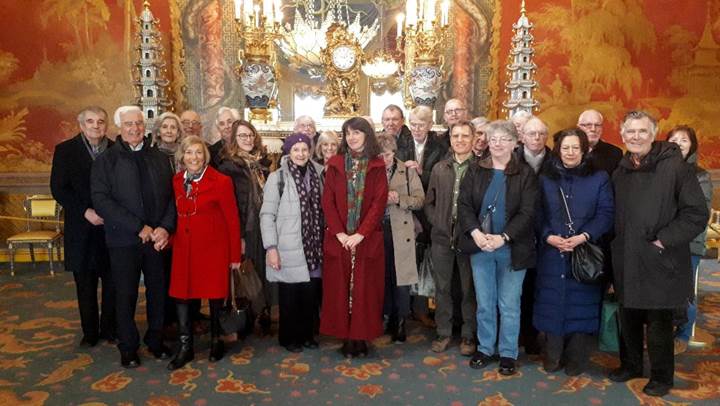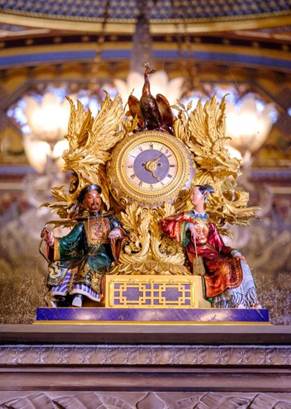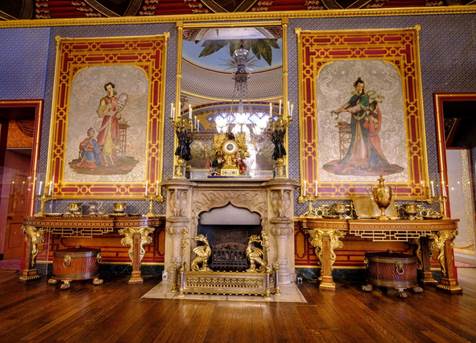THE SUSS-EX CLUB
NEWSLETTER No. 52, April 2020
Edited by Adrian Peasgood
SUSS_EX EMBRACES SOCIAL MEDIA!
We are pleased to report that in March Suss-Ex launched a Facebook group – the Suss-Ex Club. This is for existing and potential new members who use Facebook, to see and subscribe to planned events, to suggest other types of activities, and to network with each other.
This will not replace any of our existing communication channels such as the Newsletter, the website, and email – these will continue as normal. The Facebook group will be an additional means of communication and will provide a useful platform for growing our membership. For example, we know that many ex-University of Sussex staff use Facebook and this will enable us to reach that community more quickly and easily, not forgetting that existing Facebook Suss-Ex group members can invite their ex-colleagues to join the group.
The Suss-Ex Club page can be found here: https://www.facebook.com/groups/2507222389510329
You will require a Facebook account in order to subscribe to it – it is a private group, which means you can find it but you cannot see any posts until your membership request is approved.
Please visit the page and join! We will be adding more content such as Newsletters and future planned events (bearing in mind that all events are currently suspended due to Corona Virus). Nonetheless we welcome your feedback and of course suggestions for future events and activities. And please post there any photos you may have of previous Suss-Ex events – we would love to see these on the page, with details about the event and the date.
Rossana Dowsett, Jackie Fuller
THE SUSS_EX MAILING LIST
From the foundation of Suss-Ex 14 years ago our Newsletters have been circulated by e-mail wherever possible, and by post otherwise. Our membership list thus has two components: the main list, holding for each member an e-mail address with a postal address for back-up, and the postal list, with only postal addresses. As we keep postal addresses for everyone, if an e-mail bounces back as undeliverable, that member can be dropped from the main list to the postal list and thus be retained. Nevertheless the latter list is a short one, of around 80 names.
Our lists are held by DARO, the University's Development and Alumni Office, who handle the mailings, and we are grateful to them for their longstanding support. While all Newsletters are sent as hard copies to the postal list, the various reminders in between, of booking deadlines for our events, are not, and so our members on the postal list miss out on reminders.
Readers of the last Newsletter will recall a request to members on the postal list to get in touch, providing an e-mail address if possible. That resulted in just a handful of responses, giving an e-mail address in all but one case, and we are grateful for those.
Under the current Covid-19 lock-down, this Newsletter is being sent out by DARO staff working at home, to our main list only, and those on the postal list will thus not receive it or indeed be aware of it unless they happen to look for it on our website http://www.sussex.ac.uk/suss-ex . I am the member of the Steering Group who looks after our membership list, and I plan to write individually to those on the postal list, urging provision of an e-mail address if possible. It will remain to be decided, in straitened circumstances for universities when the lock-down is relaxed, whether hard-copy mailings to the postal list can be resumed.
Charles Goldie.
RECENT SUSSEX_EX PROGRAMME
Friday 6 March
Royal Pavilion: ‘A Prince’s Treasure’

On the first Friday in March (doesn’t it seem like a lifetime ago?) twenty-five of us assembled for one of Alexandra Loske’s expert curator tours of the current exhibition of ‘A Prince’s Treasure’ from Buckingham Palace and Windsor Castle. And what a tour-de-force it was for us. The lockdown had not yet started, but the usual groups of French and German teenagers had cancelled so we had the Pavilion virtually to ourselves and were able to see the building and exhibition in a uniquely relaxed atmosphere.
We started with a very interesting introductory talk in the Red Drawing Room (not open to the public) to prepare ourselves for what we were about to see and to give us the story of why and how the objects have been returned to Brighton for two years. Then during the tour we were able to get a close up view and description of some of the most spectacular objects and in particular, Alexandra’s favourites - the clock and combined barometer/thermometer in the Banqueting Room, and the wonderful pagodas in the Music Room (see the next page). We finished with some group photos in the Music Room, followed by well-earned refreshments in the Royal Pavilion Tea Room. All in all a magical day.
.
Steve Pavey


CANCELLATION
The talk by Jan Nawrocki on 31 March was one of the many victims of the national response to the coronavirus pandemic; we hope it will be possible to reschedule it later in the year.
POSSIBLE FUTURE EVENTS
Several possible events were at different stages of development when the pandemic struck. They included:
‘Hard-hat’ tour of Corn Exchange, towards the end of the restoration works
Fishbourne Roman Palace
Ridgeview winery (this would be a repeat trip)
Another meeting on a medical topic
Shoreham Harbour
Our further programme will be announced in due course!
OBITUARY: László Heltay
Newsletter 51 included a full obituary of László, and a separate short personal note. The impact he had on musical life on campus is illustrated by this further set of memories, ‘Remembering László Heltay’.
I was saddened to hear the passing of László Heltay, who had a profound effect on my life. I first encountered László at Oxford in 1961 where I was a mathematics scholar (1960-66) and played lead viola in his orchestra performing Beethoven’s C major Mass with his Kodály choir. It was an intoxicating experience. Not for him routine technicalities. I can still hear him speaking deeply saying ‘darken your voices’. He brought a profound new insight into performances. Where I had been taught that a crescendo means ‘getting louder’ and that it should not get faster, he imperceptibly moved things on until, at the climax, he placed it slightly later, producing an incredible visceral thrill.
The following year I took coffee in a café near the Martyr's memorial and László entered, totally immersed in reading the book “Wagner on Conducting”. He looked furtively at me as if he recognised me but did not remember why. I went over to him and introduced myself as a player in his orchestra and said that he was a greater conductor than any of the others who conducted college orchestras, often as organ scholars with little experience of performing with an orchestra. I said that they were so poor that I felt I could do better myself. He said “WHY DON’T YOU?”
It had never occurred to me. I had always played as a member of an orchestra and never questioned the authority of the conductor. But this single event changed my whole life. I was president of my college music society doing the dogs-body work of organising concerts and when I suggested to the college committee that I should conduct, it was met with derision, yet I persisted and it happened. I took over the college choir and built it up from around 20 singers to 150 strong in just a year to perform ‘Carmina Burana’. When I moved to Sussex in 1966, I supported a small group of around 8 singers to perform a Russian Orthodox mass at Chichester Cathedral.
In the Autumn of 1967 we sought to grow to around 16 singers so that we could perform music in multiple parts and formed ‘The A Cappella Singers’. Within a couple of weeks we had 48 singers and the university choir conducted by Evdoros Demetriou was unable to fulfil a commitment to sing in the British premiere of ‘Lehrstücke’ by Brecht and Kurt Weill, so we did it instead. In the Autumn of 1968 Demi left and László arrived to attempt to build up the music at the university under difficult circumstances, including forming the new Brighton Festival Chorus.
I urged the members of my choir to support him and sang in his Festival Chorus myself. It was an amazing experience, performing under Colin Davis and William Walton. It taught me the subtle technique of preparing a chorus for someone else to conduct as László focused on the precise written rhythms in Walton’s Belshazzar’s Feast, enabling the composer to imbue the performance with his own subtle jazz interpretation.
The following year I was head-hunted by Chris Zeeman at Warwick University to fill a dual role as mathematician and educator and moved in 1969. As a musician, I developed into an established amateur conductor of choirs, orchestras, musicals, operas and a wide range of classical music. As an academic I developed an international reputation as a professor in mathematical thinking. I retired early on health grounds in 1995 and continued as a part-time academic until taking full retirement as an emeritus professor in 2006.
I still retain my interest in mathematics, mathematical thinking and music. But the greatest of these is music, thanks to the inspiring vision of László Heltay.
David Tall (Sussex University Mathematics 1966-69).
APPENDIX
The reference below is to a University planning application which may be of interest to some members. (Please note that the closing date for comment was 28 February.)
BH2020/00011 | Demolition of Park Village, Lancaster, York, Kulukundis and Kent Houses (total of 852 bed spaces) and health centre and erection of 23no buildings ranging from 1 to 6 storeys comprising new student residences (total of 1921 bed spaces including 20 family units) and ancillary uses including new health & well-being centre, Pavilion Library, retail and restaurant/cafe together with new focal landscaped space, wider landscaping and tree planting and improved pedestrian access.
Suss-Ex
Patron: Sir Gordon Conway
The website
More information about Suss-Ex is available on its webpage at http://www.sussex.ac.uk/suss-ex/. ‘Suss-Ex Club’ in Google will get you there, as will http://tiny.cc/sussex, or you can find us in the A–Z on the University’s homepage. The website has copies of past Newsletters.
The steering committee
Suss-Ex activities are organised by a steering committee, which currently comprises:
Ross Dowsett Rossana.Dowsett@ntlworld.com
Colin Finn colinfinn@btinternet.com
Jackie Fuller jkfuller21@hotmail.com
Charles Goldie c.m.goldie@sussex.ac.uk
Arnold Goldman a.goldman@cowbeech.f9.co.uk
Steve Pavey miniperson2003@yahoo.co.uk
Adrian Peasgood adrian@peasgood.plus.com
David Smith j.d.smith@sussex.ac.uk
Paul Tofts uos@paul-tofts.org.uk, chair
Helen Walker helenjwalker@btinternet.com
Ideas for the future
We are always seeking ideas for social occasions when we can meet former colleagues. Please let us have your suggestions, or volunteer to join the committee. We meet once a term, when practicable immediately before a Suss-Ex event.